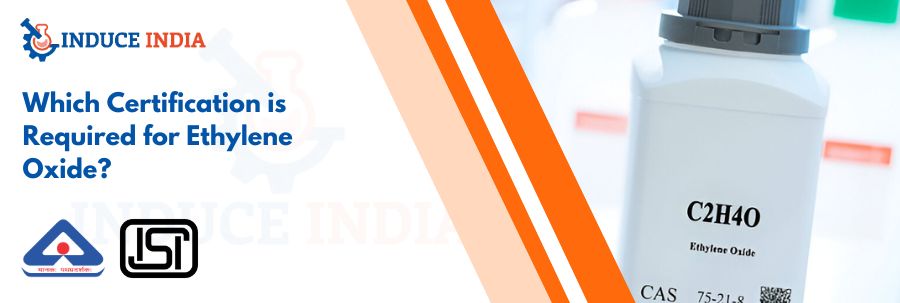If one looks at the fineries of manufacturing, EtO or Ethylene Oxide would hold a focal position in the medical, pharmaceutical, and food processing industries. It does carry the responsibility of a sterilizing agent that ensures bacteria, viruses, and all other kinds of pathogens are not formed on a delicate product. But, in the battle of good versus evil, EtO, being its powerful sterilizing agent, is also highly toxic and purportedly carcinogenic, hence making its handling, distribution, and use a very strictly regulated affair in India.
If you are either preparing to enter manufacturing, distribution, or a startup venturing into this field, then the certification requirements for Ethylene Oxide should not just be considered a mere formality, but rather, there should be concern for safety, value, and sustainable business. This blog will highlight the specific certifications required and describe their importance and how one may go about acquiring them in clear, precise, and actionable language.
What is Ethylene Oxide?
Before we delve into certification, let’s understand what we are dealing with. Ethylene Oxide is a colourless, flammable gas with a slightly sweet odour. It is widely used for:
- Sterilizing medical and surgical equipment
- Treating spices and food items that are heat-sensitive
- Producing other chemicals such as ethylene glycol (used in antifreeze)
Its ability to kill microorganisms at low temperatures makes it valuable, especially in processes where heat or radiation cannot be used. Those very properties that make EtO a bane for germs also make it a bane to human health when wrongly handled.
Why Certification Matters
In India, Ethylene Oxide is ordinarily certified under quality control laws and safety regulations. The government indeed recognizes the necessity to balance its utility with public safety and occupational safety.
Why Certification Cannot be Ignored:
Health and Environmental Safety – Certification guarantees that EtO is produced, stored, and transported safely, minimizing the hazards of exposure.
- Legal Obligations: Running without a license can lead to fines, shutdowns, and criminal offenses.
- Market Access: Such goods can get legal sale all over India and hence further into international markets.
- Brand Trust: The certification touts that the company places great value on quality, compliance, and safety for all its customers and counterparts.
Key Certification Required: BIS Certification
Ethylene Oxide is governed in India by the BIS certification.
BIS and Quality Control Order
A Department of Chemicals and Petrochemicals under the Ministry of Chemicals and Fertilizers has come out with a Quality Control Order (QCO) making it obligatory for all manufacturers and importers of Ethylene Oxide to comply with the Indian Standard IS 5573:1984 that lays down the technical, safety, and purity specifications for EtO.
Once parties have complied with it, they must take the BIS Standard Mark (ISI Mark), which is a legal recognition that enables them to manufacture, sell, or import Ethylene Oxide in India.
The BIS Certification Process: Key Steps
Application Submission: Companies have to apply to the BIS with a detailed application supported by all required documents regarding product details, manufacturing practices, and safety principles.
- Sample Testing: A sample of Ethylene Oxide is sent to be tested in laboratories recognized by BIS.
- Factory Inspection: BIS officials inspect the manufacturing facility to verify compliance with IS 5573:1984.
- Grant of License: Once all tests are cleared without questions, BIS may accept the application and grant the issuance of the license for the use of the Standard Mark.
Timelines for Certification
- Indian Manufacturers: 30 to 60 days
- Foreign Manufacturers: Up to six months since international compliance needs to be evaluated against BIS requirements
Further Certification: CDSCO Approval (For Medical Use)
Using Ethylene Oxide for the sterilization of medical devices will put you in dealing with the Central Drugs Standard Control Organization (CDSCO).
Ethylene Oxide Gas Sterilizers fall under Class C medical devices as per the Medical Devices Rules of 2017. This entails manufacturers obtaining a manufacturing license under Form MD-9 from the CDSCO.
CDSCO Licensing Comprises:
- Technical documentation of the sterilizer equipment
- Quality control procedures and GMP (Good Manufacturing Practices) compliance
- Environmental safety compliance
- Periodic inspections and audits
This ensures that the sterilizers are not only apt from the standpoint of performance but also safe to be used in hospitals or industries.
Who Needs These Certifications?
Any business falling under any of the categories outlined below must secure BIS certification and possibly CDSCO certification:
- Chemical manufacturers producing or repackaging Ethylene Oxide
- Importers bringing EtO into India
- Makes medical devices and is sterilised with EtO
- Sterilization service providers
- Pharma or food industries involved in the outsourced treatment of EtO
In India, if your operation is small or localized, certification is mandatory unless your product is strictly for export and finds no market in India.
Challenges in Obtaining Certification
The certification process, while necessary, often becomes cumbersome. Typically, businesses face:
- Lengthy documentation and red tape
- Technical complexities of the system to comply with the IS standards
- Exorbitant costs for facility upgrades, lab testing, and audits
- Coordination problems, especially for foreign applicants
Though minor when compared with what can happen in return should the company fail to comply, i.e., litigation and loss of business reputation, it would significantly affect the human health consequences.
How to Get Started?
At Induce India, we accompany clients from all industries through the maze of certification. The following steps are advisable:
- Audit your facility: Ascertain whether your existing setup conforms to BIS and CDSCO standards.
- Engage experts: Engage the services of certification advisers or compliance consultants to fast-track the certification.
- Investment planning: Anticipate the need to test, train, and upgrade infrastructure.
- Keep up-to-date with changes: As regulatory standards are bound to change, periodic reviews shall allow your ongoing compliance.
Final Thoughts
Being permitted to use ethylene oxide pursues the protection. Ethylene oxide sterilization and chemical processing are extremely useful, but the barrier needs to be a very thin one of caution and compliance. Ethylene oxide certification thus creates for your company a legal framework to safeguard it, also allowing the company to build up a good brand in the marketplace.
Thus, obtaining Ethylene Oxide certification is the antecedent to safe, successful, and sustainable growth, be it for new product launches, scaling up activities, or gazing infinitely into export markets.



